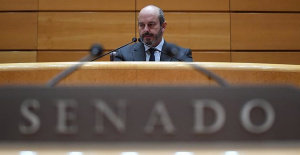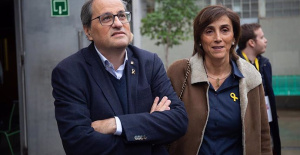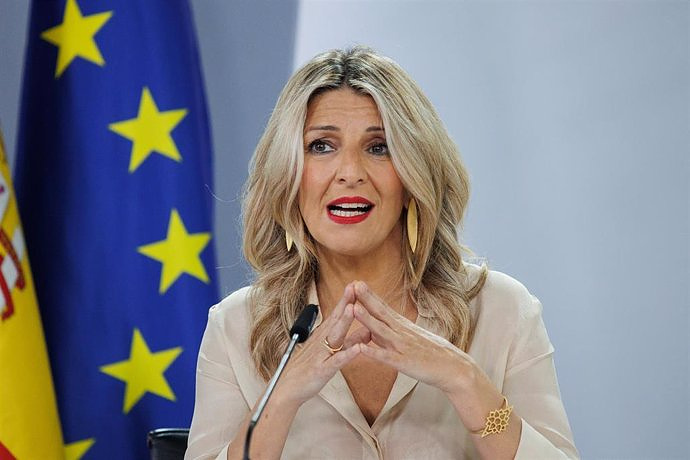They see no reason to question the Spanish courts because those affected acted against the law and disregarded the Constitutional Court
MADRID, 31 Ago. (EUROPA PRESS) -
Two of the 17 members of the United Nations (UN) Human Rights Committee have disagreed with the opinion in which it is concluded that Spain violated the political rights of the former Catalan vice president Oriol Junqueras and the former councilors Raül Romeva, Josep Rull and Jordi Turull when he suspended his public functions after being prosecuted and without waiting for the 'procés' conviction. They have insisted that the action of the Spanish courts was "reasonable and timely."
José Santos Pais, from Portugal, and Wafaa Bassim, from Egypt, have stressed that Junqueras and the three former councilors acted against the law and disregarded the decisions of the Constitutional Court. "Their rights were restricted because they resorted to illegal means instead of the constitutional avenues available to amend the Constitution," the two experts said.
In his opinion, the measure of suspension of public functions imposed was "reasonable, necessary, proportionate" and "foreseeable" in the "serious circumstances that the domestic courts were facing at that time." The two dissenting members have stressed that the measure was adopted by a judge "after a deep and detailed reasoning of all the available evidence" at that time, "in the framework of a criminal investigation with all the guarantees of due process."
The four independence leaders were prosecuted, along with other leaders, for the crime of rebellion, which requires a violent uprising against the constitutional order. In July 2018, they were suspended from their positions as deputies in accordance with the Criminal Procedure Law, which allows the suspension of officials only when they are accused of rebellion. In October 2019, they were convicted of sedition.
After analyzing the case, Pais and Bassim have assured that they do not see a violation of the political rights of Junqueras, Romeva, Rull and Turull, included in article 25 of the International Covenant on Civil and Political Rights.
Both have argued that the Spanish courts interpreted the crimes of rebellion and sedition "in a reasonable and timely manner." And they have concluded that, therefore, "the Committee should not act as a fourth instance to question its analysis."
For Pais and Bassim "there was no arbitrariness or denial of justice by the national courts, nor was irreparable damage caused" to the former vice president and the three former counselors. In line, they have recalled that the four "recovered their political rights (most of them were elected members of the Cortes Generales in 2019)".
In this sense, they have explained that the Supreme in its sentence finally concluded that the four had committed a crime of sedition and not of rebellion, for which the suspension imposed was revoked. In his opinion, "the course of events only reflects the regular functioning of national courts, where a later decision (during the trial) evaluates and changes an earlier decision (by the investigating judge) in the face of more detailed and extensive evidence."
Of the 17 members of the Committee, one --Spanish-- has abstained from participating in the vote and two --Pais and Bassim-- have voted against. In the opinion, of 18 pages and that has been collected by Europa Press, it has been recalled that, "given that exceptional suspensions of public functions are imposed prior to the existence of a conviction, the necessary standards for the compatibility of these suspensions with the Pact --of the UN Committee-- would be, in principle, stricter than those applied after the existence of a conviction".
The Committee has considered that Spain "has not shown" that the application of the national laws that provide for suspension in office has been carried out in compliance "with the predictability requirement demanded by Article 25 of the Covenant."
Thus, understanding that the decision was not based on reasonable or objective reasons, it has ruled that article 25 of the International Covenant on Civil and Political Rights was violated, which includes the right to "vote and be elected in periodic, authentic elections, held by universal and equal suffrage and by secret ballot that guarantees the free expression of the will of the electors".
For this reason, he recalled that the State now has the obligation to provide complainants with an effective remedy, and this "requires comprehensive reparation for individuals whose rights have been violated." But he has specified that, in the present case, his opinion on the merits of the claim "constitutes sufficient reparation for the determined violation."

 Exploring Cardano: Inner Workings and Advantages of this Cryptocurrency
Exploring Cardano: Inner Workings and Advantages of this Cryptocurrency Seville.- Economy.- Innova.- STSA inaugurates its new painting and sealing hangar in San Pablo, for 18 million
Seville.- Economy.- Innova.- STSA inaugurates its new painting and sealing hangar in San Pablo, for 18 million Innova.- More than 300 volunteers join the Andalucía Compromiso Digital network in one month to facilitate access to ICT
Innova.- More than 300 volunteers join the Andalucía Compromiso Digital network in one month to facilitate access to ICT Innova.-AMP.- Ayesa acquires 51% of Sadiel, which will create new technological engineering products and expand markets
Innova.-AMP.- Ayesa acquires 51% of Sadiel, which will create new technological engineering products and expand markets The amnesty faces its final stretch in the Senate with the question of whether it will be voted this week or after the Catalan elections.
The amnesty faces its final stretch in the Senate with the question of whether it will be voted this week or after the Catalan elections. The PP will send to Moncloa the 1,136 letters from citizens with their real problems that it received in Sánchez's reflection
The PP will send to Moncloa the 1,136 letters from citizens with their real problems that it received in Sánchez's reflection Carola Miró, wife of former president of the Generalitat Quim Torra, dies
Carola Miró, wife of former president of the Generalitat Quim Torra, dies 12M.- Díaz asks Sánchez to recognize the Palestinian State in the next Council of Ministers
12M.- Díaz asks Sánchez to recognize the Palestinian State in the next Council of Ministers How Blockchain in being used to shape the future
How Blockchain in being used to shape the future Not just BTC and ETH: Here Are Some More Interesting Coins Worth Focusing on
Not just BTC and ETH: Here Are Some More Interesting Coins Worth Focusing on A sensor system obtains the fingerprint of essential oils and detects if they have been adulterated
A sensor system obtains the fingerprint of essential oils and detects if they have been adulterated Faraday UPV presents the 'Origin' rocket to exceed 10 km of flight: "It is the beginning of the journey to space"
Faraday UPV presents the 'Origin' rocket to exceed 10 km of flight: "It is the beginning of the journey to space" The Generalitat calls for aid worth 4 million to promote innovation projects in municipalities
The Generalitat calls for aid worth 4 million to promote innovation projects in municipalities UPV students design an app that helps improve the ventilation of homes in the face of high temperatures
UPV students design an app that helps improve the ventilation of homes in the face of high temperatures A million people demonstrate in France against Macron's pension reform
A million people demonstrate in France against Macron's pension reform Russia launches several missiles against "critical infrastructure" in the city of Zaporizhia
Russia launches several missiles against "critical infrastructure" in the city of Zaporizhia A "procession" remembers the dead of the Calabria shipwreck as bodies continue to wash up on the shore
A "procession" remembers the dead of the Calabria shipwreck as bodies continue to wash up on the shore Prison sentences handed down for three prominent Hong Kong pro-democracy activists
Prison sentences handed down for three prominent Hong Kong pro-democracy activists ETH continues to leave trading platforms, Ethereum balance on exchanges lowest in 3 years
ETH continues to leave trading platforms, Ethereum balance on exchanges lowest in 3 years Investors invest $450 million in Consensys, Ethereum incubator now valued at $7 billion
Investors invest $450 million in Consensys, Ethereum incubator now valued at $7 billion Alchemy Integrates Ethereum L2 Product Starknet to Enhance Web3 Scalability at a Price 100x Lower Than L1 Fees
Alchemy Integrates Ethereum L2 Product Starknet to Enhance Web3 Scalability at a Price 100x Lower Than L1 Fees Mining Report: Bitcoin's Electricity Consumption Declines by 25% in Q1 2022
Mining Report: Bitcoin's Electricity Consumption Declines by 25% in Q1 2022 Oil-to-Bitcoin Mining Firm Crusoe Energy Systems Raised $505 Million
Oil-to-Bitcoin Mining Firm Crusoe Energy Systems Raised $505 Million Microbt reveals the latest Bitcoin mining rigs -- Machines produce up to 126 TH/s with custom 5nm chip design
Microbt reveals the latest Bitcoin mining rigs -- Machines produce up to 126 TH/s with custom 5nm chip design Bitcoin's Mining Difficulty Hits a Lifetime High, With More Than 90% of BTC Supply Issued
Bitcoin's Mining Difficulty Hits a Lifetime High, With More Than 90% of BTC Supply Issued The Biggest Movers are Near, EOS, and RUNE during Friday's Selloff
The Biggest Movers are Near, EOS, and RUNE during Friday's Selloff Global Markets Spooked by a Hawkish Fed and Covid, Stocks and Crypto Gain After Musk Buys Twitter
Global Markets Spooked by a Hawkish Fed and Covid, Stocks and Crypto Gain After Musk Buys Twitter Bitso to offset carbon emissions from the Trading Platform's ERC20, ETH, and BTC Transactions
Bitso to offset carbon emissions from the Trading Platform's ERC20, ETH, and BTC Transactions Draftkings Announces 2022 College Hoops NFT Selection for March Madness
Draftkings Announces 2022 College Hoops NFT Selection for March Madness




























